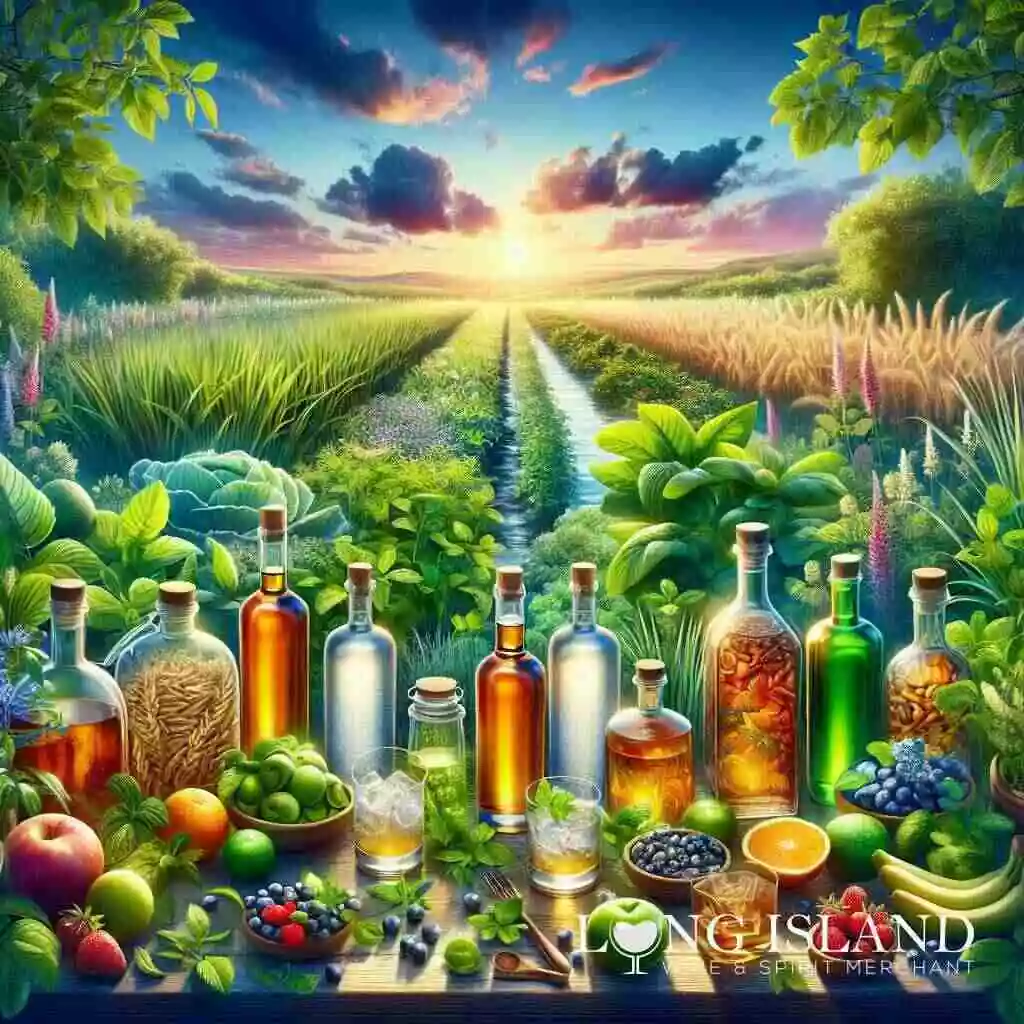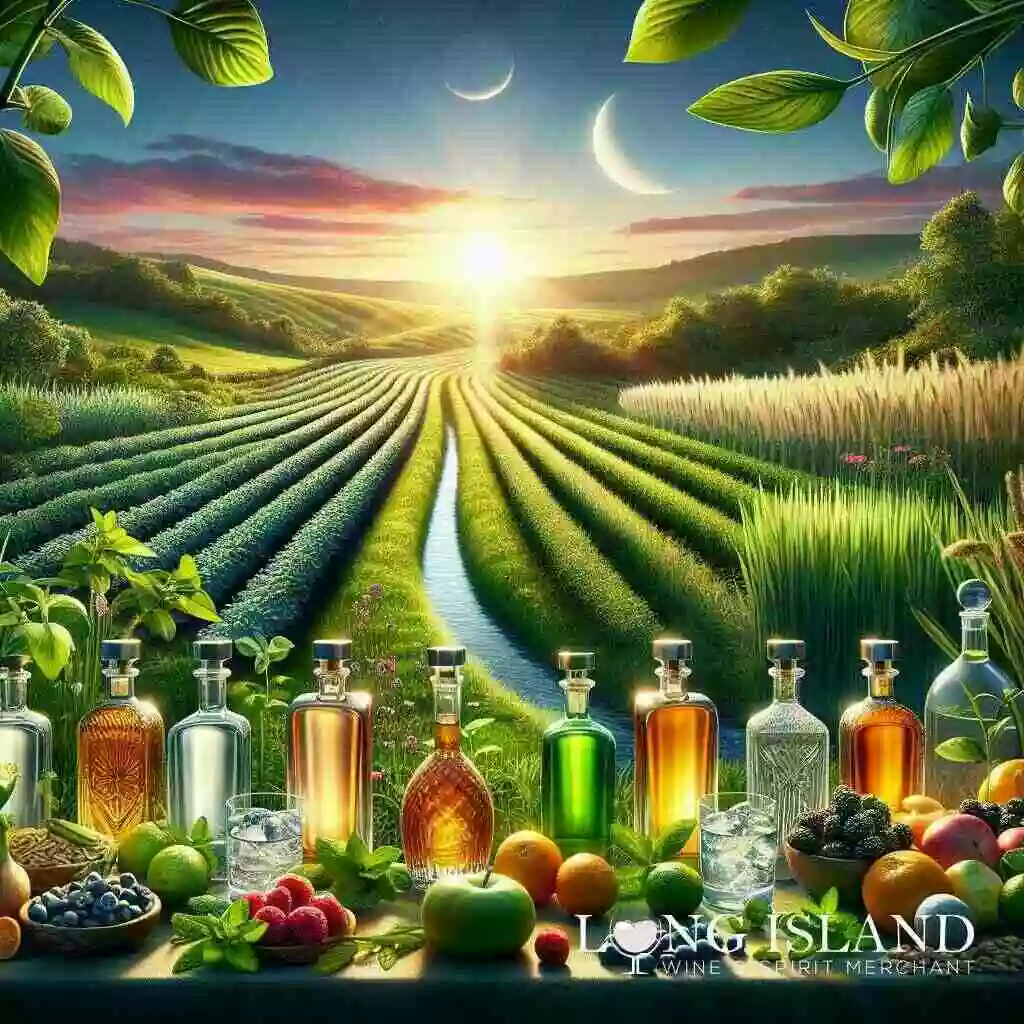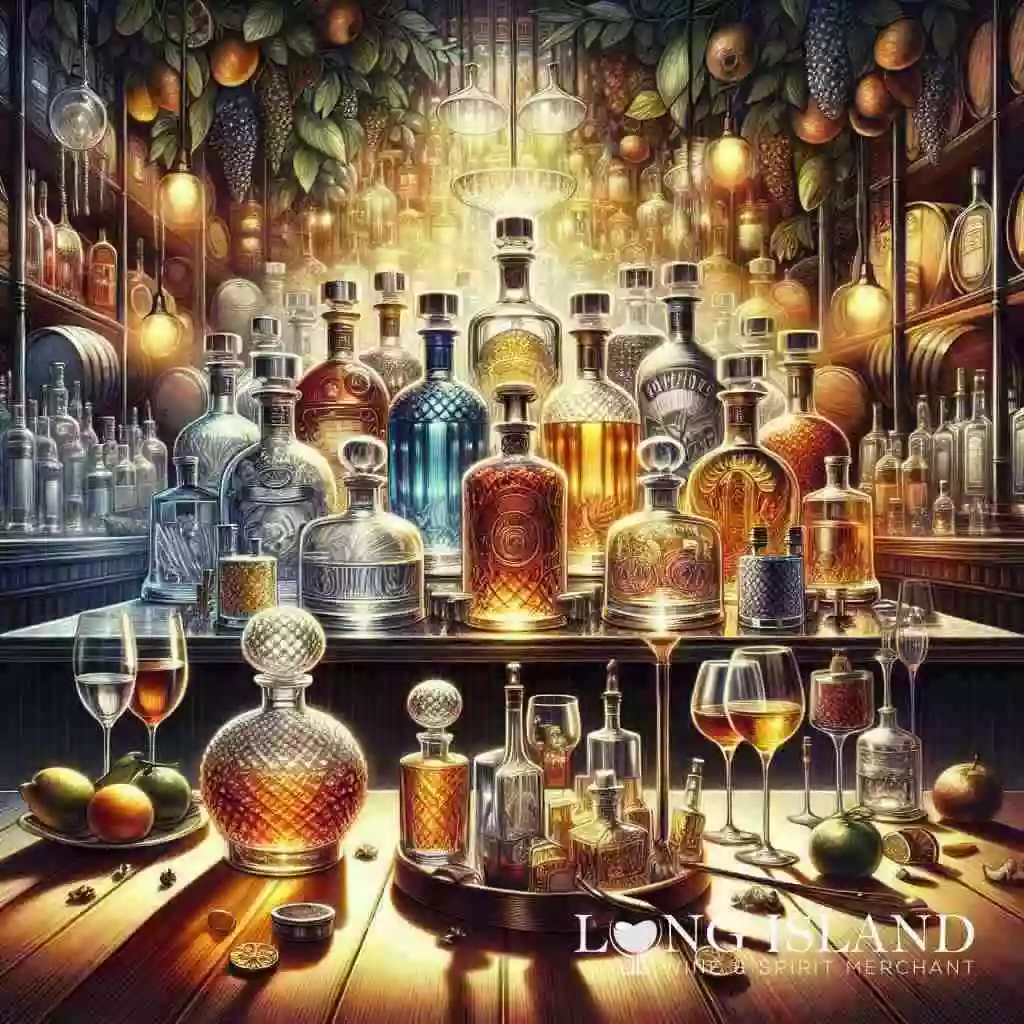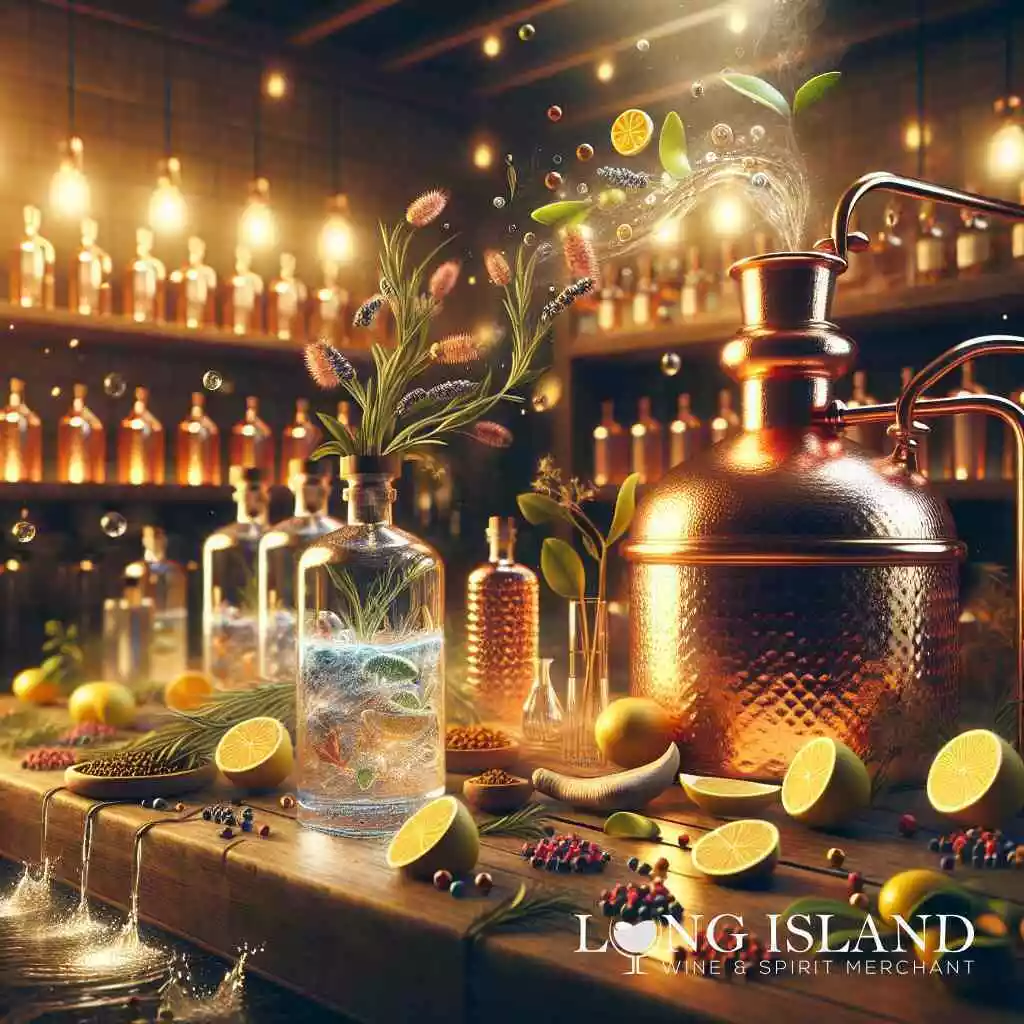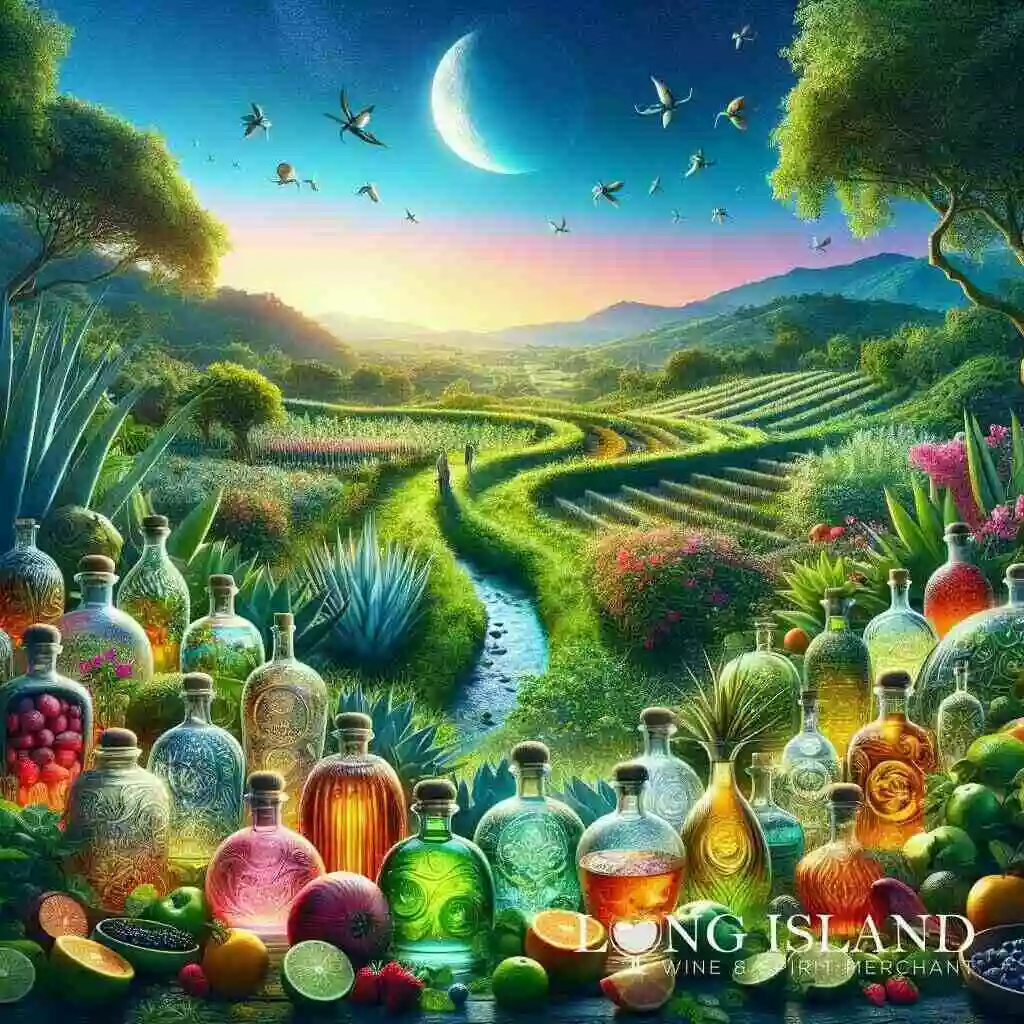
Ultimate Guide to Organic Spirits for Health-Conscious Drinkers
May 2, 2024
Introduction to Organic Spirits
The Rise of Organic Spirits
The movement towards organic spirits reflects a broader trend of health-conscious consumers demanding greater transparency and environmental consideration in their beverage choices. In recent years, the appeal of organic spirits has surged, paralleling the organic food movement. Distilleries around the globe are increasingly committed to producing spirits that champion organic ingredients, sustainable distillation practices, and eco-friendly packaging. This shift is not just a nod to environmental stewardship but also a response to a growing segment of consumers who prioritize purity, authenticity, and sustainability in their drinking experience.
What Makes a Spirit Organic
A spirit is deemed organic when it’s produced from ingredients that are grown without synthetic fertilizers, pesticides, or genetically modified organisms (GMOs). From the grains used in whiskey to the botanicals in gin, every element must be certified organic. The distillation process itself also falls under stringent regulations to ensure no contamination with non-organic substances. Additionally, the U.S. Department of Agriculture (USDA) and various international bodies provide organic certification for spirits, reflecting compliance with these rigorous standards. The journey to obtain organic certification is a testament to a distillery’s commitment to sustainability and quality.
Benefits of Choosing Organic
Opting for organic spirits offers a plethora of benefits, both personally and environmentally. For health-conscious drinkers, organic spirits mean indulging in a cleaner beverage with fewer additives and residual chemicals, aligning with a wholesome lifestyle. Environmentally, supporting organic spirits encourages sustainable farming practices, reduces water and soil pollution, and promotes biodiversity. Furthermore, many argue that organic spirits offer a superior taste profile, with purer flavors and a more authentic tasting experience. Embracing organic spirits is not just a trend but a conscious choice to support environmental health and enjoy high-quality, flavorful beverages.
Understanding Organic Certifications
USDA Organic and Beyond
The certification of spirits as organic is a rigorous process aimed at ensuring the integrity of the products from farm to bottle. In the United States, USDA certified organic liquor services is a significant mark of quality and sustainability. To earn this certification, spirits must comply with strict standards that include the prohibition of synthetic pesticides, herbicides, and fertilizers in the farming of grains, fruits, and botanicals. Additionally, the distillation process must avoid synthetic substances, and any additional ingredients must also be certified organic. Beyond the USDA, several other certifications entail similar or even more stringent standards, aimed at preserving the environment and ensuring consumer health. Distilleries pursuing these certifications often go beyond the minimum requirements, embracing practices such as water conservation, renewable energy, and waste reduction to further solidify their commitment to eco-friendly spirit production.
International Organic Standards
Internationally, organic certification standards can vary significantly, but many align closely with the principles set by the USDA. The European Union, Japan, Canada, and other regions have their own organic certifications, each with its specific criteria but generally aiming to ensure that organic spirits are produced through sustainable and environmentally friendly methods. These standards help to guarantee that the ingredients used in the organic spirits are free from genetically modified organisms (GMOs) and synthetic agricultural chemicals. Navigating these international standards requires distilleries to adhere to rigorous cross-border certification processes, ensuring that global consumers can enjoy high-quality organic spirits that meet a universally respected benchmark of organic integrity.
Reading Labels: Identifying Authentic Organic Spirits
When shopping for organic spirits, reading labels can be both enlightening and confusing. Authentic organic spirits will carry specific labeling that indicates their compliance with organic standards. In the U.S., a USDA Organic seal is a reliable indicator of compliance with national organic standards. However, the label alone isn’t always enough,savvy shoppers should look for additional information such as specific organic certifications, details about the distillery’s sustainable distillation practices, and the absence of additives or artificial ingredients. This attention to detail not only ensures that you’re purchasing real organic spirits but also supports distilleries that are genuinely committed to preserving the environment and offering a cleaner, healthier product. Familiarizing oneself with the symbols and language used on these labels is an essential step for health-conscious consumers aiming to make informed decisions about their liquor purchases, steering them towards products that align with their values of clean drinking and environmental responsibility.
The World of Organic Vodka
Top Organic Vodka Brands
For enthusiasts who seek spirits that are kind to both body and earth, the selection of organic vodka brands has never been more appealing. Leading the charge, brands like Square One and Ocean Vodka have set high standards for what it means to produce vodka sustainably, without sacrificing purity and taste. These brands, among others available at Liquor Store Open-the premier online shop for fine spirits-showcase a commitment to using non-GMO grains and pristine water sources. This dedication not only enhances the vodka’s quality but also supports eco-friendly spirit production, making them top choices for those who indulge mindfully.
Crafting Process
The path to creating exquisite organic vodka is paved with adherence to sustainable distillation practices and meticulous selection of ingredients. Typically, organic vodka begins with the cultivation of non-GMO grains or potatoes, farmed without synthetic pesticides or fertilizers. The purity of the water, often sourced from natural springs or aquifers, plays a crucial role in the distillation process. Distilleries focusing on organic vodka, like those highlighted in Liquor Store Open’s craft organic spirits guide, employ green energy sources and waste reduction techniques to minimize their environmental footprint. This careful, environmentally conscious approach ensures a cleaner product and a clearer conscience for the discerning drinker.
Tasting Notes and Pairings
Organic vodka, known for its smoothness and clean taste, offers a unique experience for the palate. Brands such as Tru Organic Vodka or Prairie Organic Vodka feature tasting profiles that range from crisp and clear with subtle hints of sweetness to more complex, earthy tones that reflect their organic grain origins. When it comes to pairings, these organically distilled spirits shine brightly. Their neutrality makes them perfect companions to a wide variety of mixers for clean drinking organic cocktails, from the simple purity of a vodka soda to more elaborate concoctions infused with organic fruits, herbs, and spices. For an elevated tasting experience, consider exploring organic vodka tasting notes, which can guide you to discover perfect pairings that enhance both the spirit and the accompanying flavors, making each sip an exercise in conscientious enjoyment.
Exploring Organic Gin
Distilling Organic Gin
Organic gin distillation marries age-old traditions with the principles of organic farming and eco-conscious production methods. At the heart of organic gin distilling lies the commitment to non-GMO botanicals and grains, ensuring every ingredient from the juniper berries to the unique blend of herbs and spices meets rigorous organic standards. Such a process not only guarantees the absence of synthetic chemicals but also enhances the gin’s flavor profile, offering a cleaner, more authentic taste. Distilleries dedicated to crafting organic gin often employ traditional methods, such as copper pot distillation, combined with sustainable practices in water and energy use, showcasing an admirable fusion of heritage and environmental stewardship.
Notable Organic Gin Labels
In the burgeoning market of organic spirits, several gin labels stand out for their commitment to quality and sustainability. These notable organic gin labels champion the use of fully organic botanicals, creating spirits that are not only environmentally friendly but also distinct in taste and character. Among them, brands like Juniper Green Organic London Dry Gin and Prairie Organic Gin have garnered acclaim for their superior quality and innovative use of organic ingredients. These brands, along with others, exemplify the diverse possibilities within the realm of organic gin, each bringing its unique flavor profile that ranges from classic to contemporary, catering to the palate of every gin enthusiast seeking purity and sustainability in their spirit of choice.
Organic Gin Cocktail Ideas
The clean, nuanced flavors of organic gin make it an excellent base for clean drinking organic cocktails. Whether it’s a simple gin and tonic enhanced with organic lime, or more elaborate mixes that showcase the gin’s botanicals, there’s a plethora of cocktail ideas to explore. For instance, an Organic Gin Martini, with a twist of organic lemon peel, elevates the classic martini to new heights of freshness and flavor. Similarly, the Organic Negroni, substituting standard ingredients with organic gin, vermouth, and Campari, offers a guilt-free version of this beloved cocktail. Adventurous mixologists might also experiment with seasonal organic fruits and herbs, creating bespoke concoctions that highlight the gin’s complexity. These organic gin cocktail ideas not only cater to the health-conscious drinker but also contribute to a drinking culture that values taste, health, and environmental sustainability equally.
Discovering Organic Whiskey
Ageing Process of Organic Whiskey
The aging process of organic whiskey is a meticulous journey that transforms simple organic grains into complex, flavorful spirits. This process begins with selecting non-GMO grains that are grown without synthetic fertilizers or pesticides. Once distilled, the spirit is aged in barrels, typically made from charred oak, which contributes to the whiskey’s final color, flavor, and aroma. Organic whiskey distilleries adhere to strict organic standards throughout this process, ensuring that from the field to the barrel, every step supports sustainable agriculture and eco-friendly production methods. The interaction between the organic whiskey and the oak over time allows the spirit to extract a range of flavors from the wood, including vanilla, caramel, and spice, resulting in a richer and more nuanced final product. This careful, environmentally-conscious approach not only benefits the planet but also enhances the quality of the whiskey, offering a purer and more authentic tasting experience for enthusiasts.
Prominent Organic Whiskey Brands
In the realm of spirits, premium organic spirit brands are redefining the whiskey industry by emphasizing quality, sustainability, and craftsmanship. These brands, distinguished by their commitment to organic ingredients and eco-friendly distillation processes, offer some of the finest organic whiskies on the market. Names such as Bruichladdich and High West have gained prominence for their dedication to producing top-tier organic whiskies that appeal to both connoisseurs and environmentally-conscious drinkers alike. These distilleries source high-quality, organic grains and employ traditional distillation methods, all while adhering to strict environmental standards. The result is a range of organic whiskies that are not only exceptional in taste but also align with the principles of sustainability and ethical consumption. For those looking to explore the world of organic whiskey, these brands represent the pinnacle of what it means to combine the art of whiskey making with responsible production practices.
Savoring Organic Whiskey: Tips and Tricks
Enjoying organic whiskey is an art that goes beyond mere consumption, inviting a deeper appreciation for the spirit’s purity, flavor profile, and origin. To truly savor organic whiskey, start by choosing a glass that enhances the whiskey’s aromas, such as a tulip-shaped snifter or a Glencairn glass. When tasting, take a moment to note the whiskey’s color and aroma before taking a sip, allowing the complex bouquet of scents to inform your initial impression. Appreciating the subtleties in flavor is key,look for the nuances derived from organic grains and the character imparted by the aging process in charred oak barrels. Experimenting with water or ice can also reveal new dimensions of the whiskey, as a few drops of water may unlock hidden flavors and soften the spirit’s intensity. Pairing organic whiskey with food can further enhance the experience, with options ranging from dark chocolate to aged cheeses complementing the whiskey’s richness and depth. By adopting these tips and tricks, enthusiasts can elevate their organic whiskey experience, discovering the intricate balance of flavors and the craftsmanship behind each bottle.
Organic Tequila and Rum
The Making of Organic Tequila
The production of organic tequila represents a harmonious blend of traditional tequila-making techniques with the stringent requirements of organic agriculture. At its core, organic tequila starts with the cultivation of blue agave plants in soil free from synthetic pesticides and fertilizers, ensuring that each agave plant absorbs only natural nutrients. This eco-friendly spirit production method not only supports a healthier environment but also contributes to the unique taste profile of organic tequila. The harvested agave is then cooked, traditionally in brick ovens, and fermented with natural yeasts, a process that further highlights the importance of maintaining purity at every step. Distillation follows in stainless steel stills, where the essence of the agave is captured in what eventually becomes a bottle of premium organic tequila. This meticulous approach ensures that every sip carries the authentic essence of the agave, alongside a commitment to sustainability and environmental responsibility.
Organic Rum: A Tropical Delight
Organic rum invites drinkers into a world where the lush flavors of the tropics meet the principles of organic farming. The journey to crafting this delightful spirit begins with the selection of non-GMO sugarcane, grown under the warm sun without the aid of harmful chemicals. The harvested cane is pressed to extract its sweet juice, which is then allowed to ferment, transforming it into a vibrant, flavorful base. This base is distilled, focusing on retaining the sugarcane’s natural tropical flavors, and aged in barrels that impart depth and complexity to the rum. The result is a spirit that not only supports the ecosystem in which its ingredients were grown but also provides a purer, richer taste experience. Organic rum exemplifies how sustainable practices can lead to superior quality, embodying the essence of its tropical origins with every drop.
Recommended Organic Tequila and Rum Brands
Navigating the world of organic spirits can be as thrilling as discovering a hidden cove or an untouched beach, especially when it comes to tequila and rum. For those eager to explore the flavors of organic tequila brands, options such as Tequila Alquimia and 4 Copas stand out for their commitment to organic methods and exceptional quality. These brands showcase the heights tequila can reach when produced in harmony with nature, offering a pure, unadulterated taste of agave. On the rum side, brands like Papas Pilar and Flor de Caña offer a glimpse into the rich heritage and bright future of organic rum. They embody the spirit of adventure with their sustainable practices and rich, nuanced flavors that transport you straight to the tropics. By choosing these recommended brands, enthusiasts not only elevate their drinking experience but also support the growth of organic, eco-conscious spirit production globally.
Natural Wine and Biodynamic Spirits
Introduction to Biodynamics in Winemaking
Biodynamic winemaking takes organic practices a step further by treating the vineyard as a self-sustaining ecosystem. This holistic approach, rooted in the ideas of philosopher Rudolf Steiner, applies lunar and cosmic rhythms in the timing of agricultural activities to enhance soil health and plant growth. Unlike traditional methods, biodynamics eschew synthetic chemicals, relying instead on natural composts and preparations to enhance vine vitality. The objective is to achieve balance in the vineyard, enabling grapes to express the true essence of their terroir. Vineyards embracing biodynamic practices believe this meticulous attention to environmental harmony results in wines of unparalleled purity and expression.
Benefits of Natural Wine
Natural wines, often produced under biodynamic or organic guidelines, offer a variety of benefits that go beyond their environmental impact. First and foremost, these wines are made with minimal intervention in both the vineyard and winery, meaning no added chemicals, sulfites, or artificial yeasts influence the fermentation process. This wine fermentation method preserves the wine’s authenticity, offering drinkers a genuine taste of the vineyard’s unique character. Advocates for natural wines argue that this approach leads to a healthier drinking experience, as the wines contain fewer additives that can cause adverse reactions in some individuals. Furthermore, natural wines often exhibit unique, complex flavors that challenge and delight the palate, providing an adventurous tasting experience that reflects the true nature of the wine’s origin.
Selecting the Perfect Organic Wine
Choosing the perfect organic wine involves more than just looking for the organic label. It’s about understanding the winemaker’s commitment to sustainability and the impact of their practices on both the environment and the wine’s quality. When navigating the options, consider the wine’s certification, whether it’s organic, biodynamic, or natural, as this can give insight into the methods used during production. Explore the stories behind the wineries and their philosophies towards winemaking,those with a genuine commitment to earth-friendly practices often produce wines that are not only better for the planet but also exceptional in taste. Look for varietals and regions known for organic excellence, and don’t hesitate to experiment with lesser-known wines. Retailers like Liquor Store Open offer a curated selection of organic, biodynamic, and natural wines, making it easier for consumers to discover high-quality options. The journey to finding the perfect organic wine is an adventure in taste and a step towards supporting sustainable agriculture practices worldwide.
Eco-Friendly Liquor: A Green Distillery Guide
Sustainability Practices in Distilling
The quest for eco-conscious alcoholic drinks has led to a revolution in the distilling industry. More than ever before, green distilleries are employing innovative sustainability practices that significantly reduce the environmental impact of spirit production. At the forefront are techniques such as using renewable energy sources, like solar and wind power, to fuel operations, and implementing water-saving measures to conserve precious resources. These distilleries also focus on minimizing waste by repurposing spent grains as livestock feed or compost. Furthermore, the adoption of non-GMO and organic farming practices for ingredients not only ensures a purer product but also supports a healthier ecosystem. This mindful approach to spirit distillation highlights a commitment to crafting high-quality spirits while preserving the earth for future generations.
Green Distilleries Around the World
Globally, green distilleries are setting benchmarks for environmental stewardship in the spirits industry. From Scotland to the United States, these establishments are recognized not only for their exceptional products but also for their dedication to sustainability. In Scotland, distilleries harness the power of wind and biomass to create some of the world’s most beloved whiskeys, embodying a centuries-old tradition with modern ecological consciousness. Meanwhile, in the United States, distilleries like California’s Greenbar Distillery offset carbon emissions by planting a tree for every bottle sold, embodying a tangible commitment to the environment. These distilleries prove that it’s possible to embrace traditional spirit distillation techniques while innovating to reduce the environmental footprint, fostering a healthier planet without compromising on taste or quality.
Contributing to Environmental Conservation Through Spirits Selection
Choosing spirits from environmentally friendly alcohol brands is a powerful way for consumers to contribute to environmental conservation. By supporting brands that prioritize sustainability, consumers directly impact the industry’s direction, encouraging more distilleries to adopt eco-friendly practices. These decisions go beyond just choosing an organic vodka tasting notes,they reflect a broader commitment to supporting operations that focus on reducing waste, conserving water, and lowering carbon footprints. Furthermore, purchasing spirits from green distilleries often means investing in companies that value not only the environment but also the quality and purity of their products. As the demand for these spirits grows, it sets a precedent for the entire industry, fostering a future where exceptional spirits and environmental stewardship go hand in hand.
Crafting Organic Cocktails
Organic cocktails are an exhilarating exploration of taste and sustainability, combining the clean essence of organic spirits with natural mixers to create drinks that delight the palate while respecting the planet. This section delves into the essential components and creative concoctions of the organic mixology realm, emphasizing how high-quality, non-GMO distilled spirits can elevate the cocktail experience. Through innovative recipes and refined techniques, the art of organic cocktails emerges as a cornerstone of the modern, health-conscious bar.
Essential Organic Cocktail Ingredients
Crafting exceptional organic cocktails begins with selecting the finest ingredients that embody purity, flavor, and ethical sourcing. The foundation of these concoctions is, naturally, organic spirits-from vodka and gin to tequila and rum, each selected for its clean, unadulterated profile and commitment to sustainable production practices. To complement these spirits, mixologists seek out organic modifiers and mixers, such as vermouths, liqueurs, and fresh juices, ensuring every element in the cocktail has been produced without synthetic pesticides or fertilizers.
Equally important are the fresh garnishes and herbs that add a final touch to the drinks,organic citrus peels, berries, mint, and basil not only enhance the cocktail’s aesthetics but also its flavor complexity, without the worry of chemical residues. Moreover, the choice of sweeteners plays a crucial role,organic agave nectar, honey, and cane sugar can provide depth and balance to cocktails, aligning with the overall ethos of organic mixology. This rigorous selection process guarantees that each ingredient contributes to the drink’s integrity, offering a truly organic, guilt-free indulgence.
Innovative Organic Cocktail Recipes
The realm of organic cocktails is ripe with innovation, as mixologists blend traditional techniques with modern flair to craft recipes that are both delicious and environmentally conscious. One standout concoction is the Organic Herb Garden Martini, a vibrant blend of organic gin, fresh lemon juice, and a syrup made from organic sugar and a bouquet of garden herbs. This cocktail exemplifies how organic ingredients can work in harmony to produce a drink that’s refreshing, aromatic, and visually stunning.
Another creative recipe is the Zero-Waste Whiskey Sour, utilizing organic bourbon, freshly squeezed organic lemon juice, and a syrup crafted from leftover citrus peels, ensuring every element of the produce is utilized to its fullest. This approach not only reduces waste but also infuses the cocktail with a depth of flavor and sustainability ethos. Additionally, the Organic Tropical Rum Punch, made with organic rum, a medley of organic tropical fruit juices, and a splash of organic sparkling water, transports drinkers to an exotic paradise, emphasizing the rich, clean flavors that organic ingredients can provide.
These recipes serve as a testament to the potential within organic mixology to reinterpret classic cocktails through a sustainable lens, offering enthusiasts a way to enjoy their favorite drinks with environmental consciousness at the forefront.
Organic Mixology Techniques
Beyond ingredients and recipes, the technique plays a pivotal role in the art of crafting organic cocktails. One fundamental method is muddling, which allows bartenders to gently release the essential oils and flavors from fresh, organic fruits and herbs without introducing toxins that could be present in non-organic produce. This technique ensures that the integrity of the organic ingredients is preserved, enhancing the cocktail’s flavor profile naturally.
Infusion is another key technique, where organic spirits are steeped with a blend of organic botanicals, fruits, or spices, allowing for the creation of bespoke flavors that are both unique and reflective of sustainable practices. This process not only elevates the complexity of the cocktails but also showcases the versatility of organic spirits as a canvas for flavor innovation.
Lastly, the use of precision in measuring and balancing the components of a cocktail cannot be overstated. Organic cocktails often feature nuanced flavors that require careful calibration to achieve the desired taste and harmony. By mastering these mixology techniques, bartenders can ensure that each organic cocktail is a meticulously crafted masterpiece, embodying the essence of clean drinking and the artistry of sustainable, high-quality spirits. Through these creative endeavors, organic mixology continues to thrive, charting a course for a future where cocktails are not just savored for their taste but also their contribution to a healthier planet.
Curating a Collection of Organic Spirits
Building an Organic Home Bar
Creating an organic home bar begins with an understanding of the unique characteristics and benefits of organic spirits. For health-conscious individuals and those passionate about sustainable practices, an organic home bar is not just a collection of liquors but a testament to mindful consumption. Start by selecting a range of basic organic spirits – vodka, gin, whiskey, rum, and tequila are staples. Prioritize products with organic certification for spirits, ensuring that your selections adhere to the highest standards of organic production. Incorporate a variety of organic modifiers, such as vermouths and liqueurs, which are essential for crafting diverse cocktails. Don’t overlook the significance of organic mixers and garnishes,fresh, pesticide-free fruits, herbs, and natural sweeteners will elevate your organic cocktails, reinforcing your commitment to clean drinking. Furthermore, supporting environmentally friendly alcohol brands not only enriches your home bar but also contributes to a healthier planet.
Storage and Care for Organic Spirits
Proper storage and care are crucial for preserving the quality and integrity of organic spirits. Unlike mass-produced spirits laden with preservatives and additives, organic spirits, particularly zero-additive distilled liquors, may require more attentive handling to maintain their pristine condition. Store your organic spirits in a cool, dark place away from direct sunlight to prevent temperature fluctuations that can affect their flavors and aromas. While most spirits don’t have a strict expiration date, it’s important to keep them properly sealed to avoid oxidation, which could alter their purity and taste. Organic liqueurs and vermouths, with their higher sugar and lower alcohol content, are more perishable and should be refrigerated after opening to extend their shelf life. Implementing these storage techniques ensures that every pour from your organic collection remains as intended: pure, flavorful, and environmentally conscious.
Must-Have Spirits for the Organic Enthusiast
For enthusiasts embarking on the organic spirits journey, certain bottles stand out as essential components of a comprehensive home bar. Organic vodka, revered for its versatility and purity, is a must-have base for a variety of cocktails. When selecting an organic vodka, look for brands that emphasize non-GMO ingredients and sustainable distillation methods. Organic gin, with its botanical richness, should also claim its spot, offering a clean and aromatic option for gin aficionados. Don’t overlook organic whiskey, whose depth and complexity are enhanced by organic grains and eco-friendly aging processes. Similarly, organic rum introduces a tropical and sustainable flair to the collection, while organic tequila shines through with the authentic taste of organically farmed agave. Each spirit not only promises a superior tasting experience but also embodies the drinker’s dedication to supporting environmentally responsible practices and natural and biodynamic wines, further expanding the horizons of the organic enthusiast. Together, these spirits create a foundation for clean, conscious drinking, allowing individuals to explore the art of organic mixology while championing sustainable and ethical alcohol production.
Premium Organic Spirits for the Connoisseur
Exploring Luxury Organic Spirits
Luxury organic spirits embody the pinnacle of craftsmanship and sustainability, offering connoisseurs an unparalleled tasting experience that aligns with their eco-conscious values. Distilleries around the world are now dedicating resources to produce organic versions of luxury vodka, rum, gin, whiskey, and tequila, using the finest organic ingredients to achieve exceptional purity and taste. These spirits are carefully distilled and often aged in eco-friendly facilities that utilize green energy sources and sustainable practices, ensuring that every sip contributes to a healthier planet. Luxury organic brands often employ traditional methods combined with innovative techniques to create exclusive and complex flavor profiles. By choosing luxury organic spirits, enthusiasts not only enjoy a superior drinking experience but also support environmentally friendly alcohol brands, driving the demand for high-quality, sustainably produced beverages.
The Appeal of Limited Edition Organic Releases
Limited edition organic releases hold a special allure for collectors and enthusiasts alike. These unique offerings, often produced in small batches, provide a snapshot of the distiller’s artistry, capturing the essence of rare organic ingredients or showcasing innovative, sustainable distillation techniques. The scarcity and storytelling behind each limited release add to their desirability, turning them into coveted items among spirit aficionados. Limited edition organic spirits often feature exclusive packaging and designs that reflect their premium nature and the distillery’s commitment to the environment. For those passionate about both the caliber and ethical sources of their liquor, investing in these limited releases not only indulges their palate but also their principles, celebrating the intersection of luxury and sustainability in the world of spirits.
Investing in High-End Organic Spirits
Investing in high-end organic spirits is becoming increasingly popular among discerning drinkers who seek to combine their appreciation for fine spirits with their environmental ethos. These premium organic options offer a way to build a collection that pays homage to the rich traditions of spirit making while advocating for responsible agricultural and production practices. Whether it’s for personal enjoyment, as part of a curated home bar, or as a thoughtful gift for a like-minded connoisseur, high-end organic spirits represent a thoughtful investment in quality, sustainability, and the future of artisanal liquor production. Investors and collectors are drawn to the story and mission behind each bottle, knowing that their purchase supports farmers who maintain pesticide-free fields and distilleries that prioritize eco-conscious practices. As the market for organic and environmentally friendly alcohol brands continues to grow, the value and significance of these high-end organic selections are set to rise, making them an appealing prospect for anyone looking to elevate their spirits collection with options that are both luxurious and aligned with a greener future.
Conclusion: The Future of Organic Spirits
The Growing Trend of Clean Drinking
The surge in popularity of organic spirits isn’t just a passing fad but a significant movement towards more health-conscious and environmentally friendly alcohol brands. As awareness about the impacts of agricultural practices on our health and the environment grows, so does the demand for purer, cleaner alcoholic beverages. Organic spirits cater to this demand by offering a product that minimizes the use of harmful pesticides, synthetic fertilizers, and genetically modified organisms. This shift towards clean drinking is propelled by a broader societal trend valuing wellness, sustainability, and eco-conscious living. The clear, discernible benefits of organic spirits-from their superior taste to their lessened environmental impact-underline why this trend is not only thriving but poised for continued growth in the beverage industry.
How Choosing Organic Supports Sustainable Practices
Opting for organic spirits is a meaningful way consumers can contribute to sustainable practices. Each purchase of an organic bottle is a vote for environmentally friendly farming techniques that preserve soil health, water quality, and biodiversity. By supporting distilleries that prioritize organic certification, eco-conscious production, and sustainable sourcing, consumers play a direct role in promoting a cleaner and greener planet. Furthermore, the organic spirits movement encourages the beverage industry as a whole to adopt more responsible practices, pushing for innovation in sustainable distillation, packaging, and beyond. The compounding effect of individual choices underscores the significant impact that opting for organic can have in fostering an eco-friendly future in spirits production and consumption.
Where to Find and Purchase Organic Spirits
Finding and purchasing organic spirits has become easier than ever, thanks to specialty retailers like Liquor Store Open. With a comprehensive selection that spans from artisanal organic gins to premium organic whiskeys, Liquor Store Open caters to the discerning tastes of health-conscious drinkers and environmental advocates alike. Their commitment to offering high-quality spirits, including a curated range of organic options, makes them a go-to destination for those looking to elevate their home bar with environmentally responsible choices. Additionally, their online platform and delivery services ensure that selecting and enjoying organic spirits is convenient and accessible, regardless of one’s location. By choosing retailers that emphasize organic and eco-friendly options, consumers not only enjoy superior beverages but also contribute to the growing momentum of sustainable and ethical practices within the spirits industry.
The future of organic spirits shines bright, heralding a era where quality, health, and environmental stewardship are paramount. As this trend continues to flourish, it invites consumers, producers, and retailers alike to partake in a movement that celebrates the purity of ingredients, the art of distillation, and the joy of savoring a drink that’s good for both the palate and the planet.
Frequently Asked Questions
Question: What makes the organic spirits selection at Liquor Store Open stand out for health-conscious drinkers?
Answer: At Liquor Store Open, we understand the priorities of health-conscious drinkers who are seeking organic spirits that align with their lifestyle. Our curated selection is rigorously chosen to ensure each bottle – be it organic vodka, gin, whiskey, tequila, or rum – meets stringent organic certification standards, such as USDA organic. By partnering with distilleries committed to sustainable distilling and employing eco-friendly practices, we guarantee our customers access to high-quality spirits made without synthetic fertilizers, pesticides, or GMOs. Our dedication to offering an expansive range of organic alcoholic beverages makes Liquor Store Open your trusted source for clean drinking and environmentally friendly spirits.
Question: Can you provide some insights on crafting organic cocktails as mentioned in “Ultimate Guide to Organic Spirits for Health-Conscious Drinkers”?
Answer: Crafting organic cocktails begins with choosing the right base – premium organic spirits which you can find in abundance at Liquor Store Open. From there, incorporating organic modifiers, fresh fruits, herbs, and natural sweeteners can elevate your drink, turning it into a sustainable indulgence. Organic mixology techniques such as muddling and infusion are essential in highlighting the essence of organic ingredients. At Liquor Store Open, not only do we supply a wide array of craft organic spirits perfect for these applications, but we also inspire our customers with cocktail recipes and tips for making their organic cocktail crafting journey both enjoyable and eco-friendly. Explore our website for impeccable organic spirits and resources to master your home bar. For further exploration, consider the range of organic spirits like Ketel One Vodka and Tito’s Handmade Vodka.
Question: How does Liquor Store Open ensure the organic certification of the spirits it offers?
Answer: Liquor Store Open takes the authenticity and integrity of its organic spirits seriously. Each product in our collection, whether it be organic vodka, gin, whiskey, rum, or tequila, has been meticulously vetted to ensure it complies with strict organic certification standards, like those set by the USDA. We engage directly with producers and distilleries dedicated to sustainable and non-GMO practices, ensuring they hold valid organic certifications. This commitment allows us to confidently offer our customers a selection of organic alcoholic beverages that are not just of the highest quality but also contribute positively to environmental sustainability and clean living.
Question: For those new to organic spirits, what recommendations can Liquor Store Open provide to start exploring?
Answer: For newcomers to the world of organic spirits, Liquor Store Open offers an extensive range of options that cater to every taste and preference. Starting with a versatile spirit like organic vodka or gin can be a great way to explore clean drinking, as they can be enjoyed neat or serve as a base for numerous organic cocktail recipes. We also recommend trying a variety of organic alcoholic beverages to discover the unique characteristics each offers, from the smoothness of organic whiskey to the vibrant notes of organic rum and tequila. Don’t hesitate to take our Wine Taste Quiz on our website, designed to help you find the perfect organic spirits that match your taste preferences, making your journey into organic spirits both enjoyable and personalized.
Question: Why should environmentally conscious consumers choose Liquor Store Open for their organic spirits?
Answer: Environmentally conscious consumers will find Liquor Store Open to be a sanctuary for their spirit needs due to our unwavering commitment to sustainability and high-quality organic products. For a deeper understanding of our ethos, the Long Island Wine & Spirit Merchant page provides insight into our dedication to offering environmentally friendly and sustainable choices. Every selection in our inventory, from organic vodka to naturally produced wines and biodynamic spirits, not only supports eco-friendly liquor production but also promotes sustainable agricultural practices. By choosing us, consumers directly contribute to the demand for environmentally friendly spirits and support the broader movement towards a more sustainable and ethical spirits industry. Consider exploring options like Casamigos – Blanco 1.75L for a taste of our commitment. Beyond our product offerings, our eco-conscious operational practices, including liquor bottle recycling and eco-friendly packaging, confirm our dedication to preserving the planet, making us the ideal choice for those who value environmental responsibility as much as their libations.
